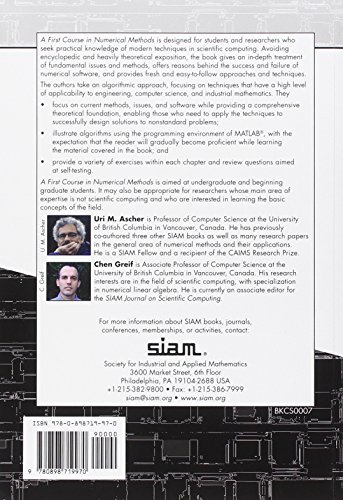Servicios al cliente
Sobre nosotros
Copyright © 2025 Desertcart Holdings Limited
Desert Online General Trading LLC
Dubai, United Arab Emirates




A First Course in Numerical Methods (Computational Science and Engineering, Series Number 7)
B**D
good reference book
The book does a great job exposing you to the concepts and it has excellent recourses on the publisher's site. It is a bit difficult to grasp certain concepts since it doesn't go into too much detail (I had to reference another book a few times). If it would go more into detail on the more difficult concepts, it would get 5 stars.
R**B
Can't vouch for the content, it was a required ...
Can't vouch for the content, it was a required text book for my son. Arrived promptly, it was the book as advertised.
M**J
Quirky and readable. You could do a lot worse.
I just finished a course which taught from this text and thought it was a pretty OK treatment of introductory topics at a high level. The style of this text is very informal -- both in language and in rigor. To me, 'Numerical Methods' implies a focus on discretization, stability analysis, and derivation. This book only flirts with these topics, and doesn't get into numerical differentialtion / integration until close to the very end. Instead, it starts with floating point math, limitations and pitfalls of roundoff error (an important topic for anyone using numerics!) and then switches to covering classical solvers (newton's method, bisection, etc), interpolation, and a quick introduction/review of Linear algebra and it's applications in numerical methods (spoiler alert: It's really important).There's not too much derivation and the focus is always on application. This can be a good thing depending on what you hope to get out of this book. Some topics are presented very matter-of-factly where you are shown how to use certain methods (interpolation, for instance) and what the pros and cons are without undue focus on their development or correctness. However, this approach can fall short when applied to more complicated topics (iterative linear solvers, linear programming), and it can leave things feeling a bit under-explained. This book is a provides a good survey of many different topics -- many of which deserve full courses in their own right -- but I suppose that's how 'first course' books go. This would be a great engineering text.To address the other reviews that this book is hard to follow, I thought it was pretty readable, but I say this coming from a math background. I would concede that some of the topics might be treated at too high a level, especially if this is your first time seeing them. Probably the most true for the sections on linear algebra and linear programming.The only other thing that requires a mention is the author's sense of humor. They try hard to make things friendly and unintimidating (which is appreciated), but sometimes it just feels forced. It's a quirky text, and you could do a lot worse. It's one of the better numerics books I've seen.
J**D
Five Stars
Very clean and nice book.
Z**E
Required for coursework
I don't like this book but it was required for coursework. I would rather buy a more common Numerical Analysis book if I were to need it as a reference.
R**S
Five Stars
It's a good textbook. and shipped fast
A**N
One Star
Difficult to follow
N**T
Not a great introductory text.
This book is used in the Numerical Analysis class I am taking this semester, and it has proved so far to be one of the most impenetrable texts I've been exposed to in my undergraduate education. Much of the notation employed is counter-intuitive and poorly explained, and I've had to resort to obtaining used copies of the Sauer book (my current favorite, in terms of understandable prose), as well as the one written by Burden and Faires in order to save myself the pain of translating their poorly documented formulae. I respect that this book was kept to a fairly low price point, and I understand that no book is perfect, but hopefully future editions make this book easier to read as the current edition borders on incomprehensible.
Trustpilot
Hace 1 mes
Hace 5 días